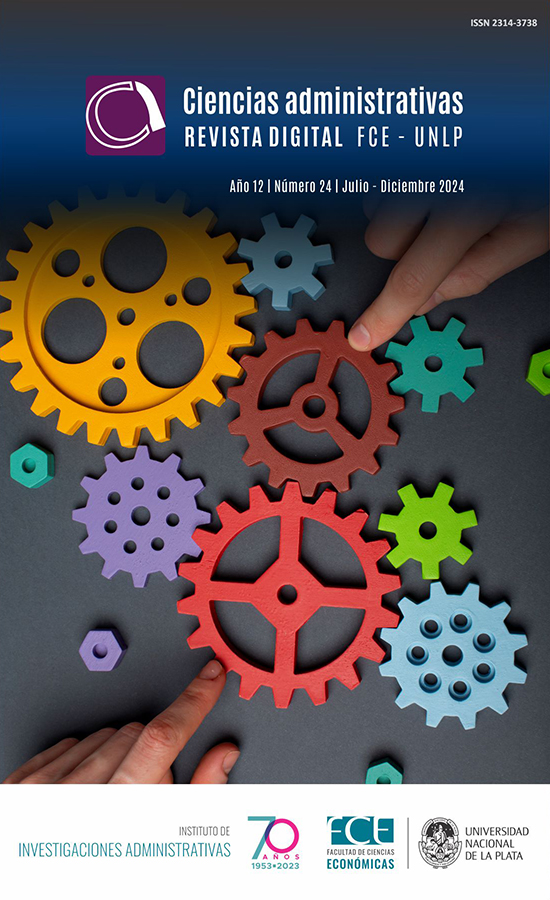Reverse Logistics in textile Micro-Enterprises: Canton Otavalo Case -Ecuador
DOI:
https://doi.org/10.24215/23143738e141Keywords:
reverse logistics, SCOR model, waste, environmental responsibilityAbstract
This article shows the results of the research carried out on the application of reverse logistics in the textile sector of the city of Otavalo, for micro-enterprises to have the possibility of recycling waste and then proceed to a new development of a new product. For this reason, it is necessary to develop the reverse logistics process and make decisions that will benefit the environment of Otavalo City.
To develop this study, It was necessary to read initially the literature such asdefinitions, and types of reverse logistics, likewise under the qualitative and quantitative method, which allowed to study of the textile microenterprise sector through surveys. Later detailed results of products, raw materials, and waste were obtained with the sole purpose of turning the waste into a final destination in the landfill generating a negative effect on the environment. With all the results, it is proposed to improve the internal and external processes of the selection of textile waste, with the support of shared responsibility of stakeholders, such as the Government, Civil Society, and Public Companies, forging awareness of the application of reverse logistics in the process of planning, implementation, control and time reduction through the SCOR model, seeking efficiency and effectiveness within micro-enterprises to finally obtain , the return of those waste for a new product.
Downloads
Metrics
References
Asociación de Industrias Textiles del Ecuador. (s.f.). Historia y Actualidad. https://www.aite.com.ec/industria.html
Bendersky, E. D. (2015). La logística inversa desde la óptica del desarrollo sostenible y la responsabilidad social empresaria [Tesis de Doctorado, Pontificia Universidad Católica Argentina]. https://repositorio.uca.edu.ar/handle/123456789/139
Cámara Pequeña Industria del Azuay. (s.f.). Pasa es Calidad. https://www.capia.com.ec/works/pasamaneria-s-a/
Diseño de un modelo logístico ambiental (verde) y reversa en los operadores logísticos en Latinoamérica. (22 de octubre de 2013). Logistec. https://www.revistalogistec.com/component/k2/item/765-diseno-de-un-modelo-logistico-ambiental-verde-y-reversa-en-los-operadores-logisticos-en-latinoamerica
Icarte Ahumada, G. A. (2016). Aplicaciones de inteligencia artificial en procesos de cadenas de suministros: una revisión sistemática. Revista Chilena de Ingeniería, 24(4), 663 -679. DOI: https://doi.org/10.4067/S0718-33052016000400011
López Espinoza, M. (2022). Propuesta de logística inversa respecto al manejo de desperdicios manufactureros del cantón Otavalo [Tesis de grado, Universidad de Otavalo]. Repositorio Universidad de Otavalo.
Manjón, N. (2 de marzo de 2020). 7R: Rediseñar, Reducir, Reutilizar, Reparar, Renovar, Recuperar y Reciclar. Ecología verde. https://www.ecologiaverde.com/7r-redisenar-reducir-reutilizar-reparar-renovar-recuperar-y-reciclar-2066.html
Silva, K., Hurtado, M. y Gonzáles, M. (2021). Cuadernos de economía y administración. Revista Compendium, 8(1), 65-84. DOI: https://doi.org/10.46677/compendium.v8i1.885
United Nations Framework Convention on Climate Change. (7 de septiembre de 2018). La ONU ayuda a la industria de la moda en su transición hacia una economía baja en emisiones. https://unfccc.int/es/news/la-onu-ayuda-a-la-industria-de-la-moda-en-su-transicion-hacia-una-economia-baja-en-emisiones
Additional Files
Published
How to Cite
Issue
Section
License
Copyright (c) 2024 Belky Nerea Orbes Revelo, Macarena Aracely López Espinoza

This work is licensed under a Creative Commons Attribution-NonCommercial-ShareAlike 4.0 International License.
Those authors who have publications with this journal, agree with the following terms:
a. Authors will retain its copyright and will ensure the rights of first publication of its work to the journal, which will be at the same time subject to the Creative Commons Atribución-NoComercial-CompartirIgual 4.0 Internacional (CC BY-NC-SA 4.0) allowing third parties to share the work as long as the author and the first publication on this journal is indicated.
b. Authors may elect other non-exclusive license agreements of the distribution of the published work (for example: locate it on an institutional telematics file or publish it on an monographic volume) as long as the first publication on this journal is indicated,
c. Authors are allowed and suggested to disseminate its work through the internet (for example: in institutional telematics files or in their website) before and during the submission process, which could produce interesting exchanges and increase the references of the published work. (see The effect of open Access)




































